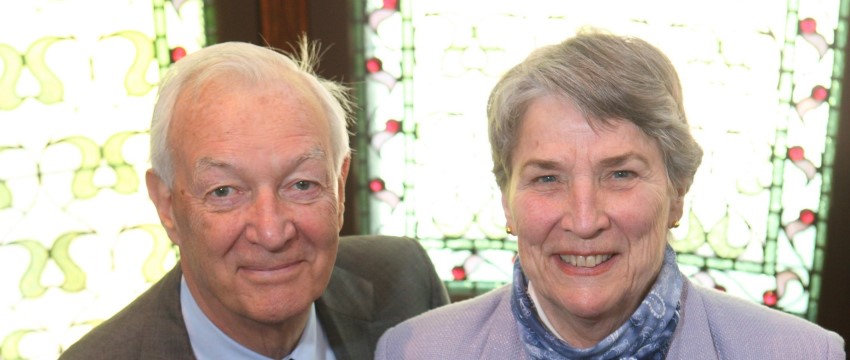
Source: By Brenda Branswell, McGill News
Many people enjoy satisfying careers, but stop working at the earliest possible opportunity.
And then there are Dr. Richard Cruess and Dr. Sylvia Cruess – or “the Cruesses” as the dynamic duo is often referred to in McGill medical circles.
A pre-retirement sabbatical in the mid-1990s had the opposite effect: it launched a new chapter in their impressive McGill medical careers.
Nearly 25 years later, and now in their late eighties, they’re still working and have “singlehandedly changed medicine’s understanding of professionalism and the role of the physician in the 21st century.”
That high praise came last fall from the Association of American Medical Colleges (AAMC), which awarded them its most prestigious honour, the Abraham Flexner Award for Distinguished Service to Medical Education.
The Cruesses have shown that professional identity formation “requires appropriate teaching and assessment for both learners and faculty, who must model the ideals of professionalism,” the AAMC noted, and have “developed associated content and assessment tools that have been used across the continuum at McGill and around the world.”
“This sort of caps the third career, which is kind of nice,” says Richard Cruess, alluding to their previous roles – he as an orthopedic surgeon and then the longest-serving dean of McGill’s Faculty of Medicine in the modern era.
An endocrinologist, Sylvia Cruess established and headed the Metabolic Day Centre, then served as director of professional services at the Royal Victoria Hospital from 1978-1995.
It was in the latter role, that medical professionalism caught her interest.
“I had seen some very good people behaving in ways I didn’t think were quite right,” says Sylvia Cruess. “And I thought that they were maybe ‘unprofessional’ and I better find out what professional is.”
They spent their sabbatical year in Princeton and Oxford and published two seminal articles in 1997 on medical professionalism – a topic absent from medical literature at the time. “They caught everybody’s attention,” she says.
“When we went to medical school, I’m sure the word ‘professional’ was used,” says Richard Cruess, but nobody really explained what it meant.
“We and every other doctor in the world became professional by watching role models and patterning our behavior. And by the way, if we had bad role models we might turn out badly.”
Dean of Medicine David Eidelman, MDCM’79, chuckles when recalling how, as a regular member of the faculty, he put up his hand during a Grand Rounds the Cruesses gave when they returned from sabbatical. “Shouldn’t everybody know this? I said stupidly. And Dick patiently explained that no, and you do have to explain it. And they’ve really developed approaches to how to do this.”
Eidelman says the Flexner award is a reflection of the impact they’ve had on the medical profession and medical education in general.
“I actually think their real lasting impact is 20 years ago nobody was talking about this or very few. And now, in every school people talk about it,” says Eidelman.
“They’ve been everywhere; they’ve been in 70 countries, 200 presentations. That’s an enormous impact.”
The couple, who met and married as medical students at Columbia University, offered a lecture on professionalism to first-year medical students at McGill. They soon realized that a single lecture wasn’t enough.
“This isn’t all us, this is a collective group, including Don [Boudreau] and Yvonne Steinert and Linda Snell [from McGill’s Centre for Medical Education],” says Richard Cruess. “We developed a longitudinal curriculum that went through all four years.”
The Cruesses have had a “huge impact” on McGill’s medical curriculum over many years, says Boudreau, an associate professor in the Department of Medicine and core member of the McGill Centre for Medical Education, who described it as an incremental, evolving process.
In their talks and research, the Cruesses note the separate but connected roles that physicians play as healers and professionals. McGill’s physicianship program, introduced in 2005, combines those roles and is one of four curricular components. “It became almost like a brand of the curriculum,” says Boudreau, who runs the program. “Then it started to have reverberations and influence outside of McGill, and then in Canada … North America and throughout the world.”
Boudeau points to several qualities as being key elements of medical professionalism, among them, altruism (putting your patients’ interests ahead of your own, even when it’s inconvenient), competence (making sure that you’re keeping your skills up-to-date), confidentiality (respecting your patients’ privacy), and self-regulation. That last one can be particularly difficult, Boudreau says, because it might mean intervening if you believe a colleague is acting in an inappropriate manner. “In a real sense, we are our brothers and sisters’ keepers.” McGill’s physicianship program, says Boudreau, “gives [students] a framework to analyze what is good doctoring and what is less than optimal doctoring.”
In recent years, the Cruesses have published articles on identity formation.
“We’ve been creating professional identities forever. It’s not a new concept,” says Richard Cruess. “It’s just that we’re now sort of realizing that that’s our explicit objective—that medical education has two objectives: knowledge and technical skills and a professional identity. A sociologist said so you come to think, act and feel like a physician.”
While it sounds like they took a methodical approach to professionalism, by defining, teaching and assessing it, “it wasn’t that way,” Richard Cruess says. “I think we always kind of felt that we might go fishing next year, but what we were doing logically always led to the next step, including identity formation.”
The Cruesses, who have upcoming presentations in the U.S. and Ireland, are incredibly generous with their time, says Boudreau. The notion of altruism, of the doctor being primarily of service to the patient, “well, they live it in their day-to-day corridor conversations. They never say no.”
More work lies ahead with a few research papers in the pipeline.
Do they still love it?
Their answer, immediately and in unison, “Oh, yeah.”
February 18, 2019
